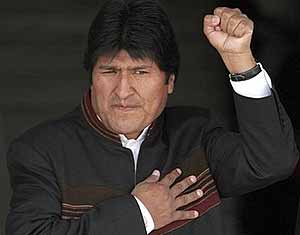29.09.2008
September 22, 2008 (the date of publication in Russian)
Ruslan Kostyuk
UNASUR INTERVENES TO PROTECT BOLIVIA
Ibero-American leaders don't want Evo Moralez to follow the fate of Salvador Allende
 The September 15 summit of the Union of South American Nations (UNASUR) elaborated a joint response to Washington's attempt to pressure the leadership of Bolivia. The recent exacerbation of political tensions between the leftist government an the rightist pro-secessionist opposition of Bolivia urged the presidents of twelve nations to establish a united front for support of president Evo Moralez who earlier declared US Ambassador Philip Goldberg a persona non grata, impelling him to leave La Paz. The US diplomat with an extensive background of service in Bosnia and Kosovo had been exposed of providing assistance to the separatists in the province of Pando, whose subversive acts disrupted delivery of Bolivian gas to Argentina and Brazil.
The September 15 summit of the Union of South American Nations (UNASUR) elaborated a joint response to Washington's attempt to pressure the leadership of Bolivia. The recent exacerbation of political tensions between the leftist government an the rightist pro-secessionist opposition of Bolivia urged the presidents of twelve nations to establish a united front for support of president Evo Moralez who earlier declared US Ambassador Philip Goldberg a persona non grata, impelling him to leave La Paz. The US diplomat with an extensive background of service in Bosnia and Kosovo had been exposed of providing assistance to the separatists in the province of Pando, whose subversive acts disrupted delivery of Bolivian gas to Argentina and Brazil.
Bolivia's President was definitely satisfied with the La Moneda Declaration, adopted in Santiago. In this document, Ibero-American leaders expressed their firm and comprehensive support of "the constitutional government of Evo Moralez that recently managed to achieve a convincing mandate of the broad majority at the referendum on confidence". The heads of South American states also claimed that they would not tolerate any "violation of constitutional law threatening the integrity of the Republic of Bolivia".
The title of the document, referring to the La Moneda Palace in Santiago, where Chile's President Salvador Allende was assassinated by the US-backed junta back in 1973, was symbolic as well. The Ibero-American leaders thus expressed their commitment to prevent a similar development in Bolivia.
UNASUR's summit officially approved Moralez's efforts for a political dialogue with the opposition, establishing a mediating commission, open for all the Ibero-American states. Foreign observers believe that the decisive role is going to be played by the Brazilian diplomacy.
Today, most of the Ibero-American states are ruled by leftist or left-centrist governments. Thus, the moral and political support of Bolivia's leadership looks perfectly justified and logical. The same is true about the geopolitical aspect of the problem.
The idea of a continental alliance of states had been discussed for several years. Still, UNASUR was officially established only in May 2008. It includes four nations of the Andean community (the north of the continent) along with the five MERCOSUR (southern) nations, as well as the "non-aligned" Chile, Guyana, and Surinam. The similarity of political strategy incites Ibero-American states to closer continental cooperation. This coordination had already demonstrated its efficiency in the joint rejection of NAFTA, pushed by Washington and Ottawa.
Today, the UNASUR member countries have got a 360 million population. With a total square of 17 million sq. km, UNASUR may be recognized as the largest economic, monetary and political alliance in the world.
Regional secessionist groups still exist in South America, but their activity does not prevent integration in a broader dimension. The Union has got a strong structure, the Presidents meeting at least once in a year, and foreign ministers meeting twice in a year.
The framework of UNASUR includes a special commission for promotion of South American integration, with permanent inter-ministerial bodies. Recently, UNASUR performed an indispensable role in settling a rather complicated diplomatic conflict between Ecuador and Colombia.
The Santiago summit adopted principal agreements on establishing a common Ibero-American market by year 2014. Besides, UNASUR is going to coordinate the activities of the Inter-American Development Bank and the Andean Development Corporation. The alliance has elaborated the strategy of construction of the inter-oceanic railroad, involving several nations of the continent, as well as the basic agreement on a joint energy policy.
The success of integrationist policies has expressed itself in freedom of travel across the continent. The citizens of UNASUR countries use a special identity card that enables citizens to travel from one country to another. Besides, Venezuela and Bolivia, with support from Brazil, initiated talks on common defense and security strategy.
The UNASUR nations still have to implement a lot of changes in order to elevate the South American integration to a qualitatively higher level. However, this intention is expressed unambiguously, and the alliance is therefore likely to develop into one of the centers of a truly multipolar world community. This perspective corresponds not only with the desire of dozens of millions Ibero-American people and their "red" or "rosy" governments, but also with Russia's geopolitical priorities.
Number of shows: 1254
 ENG
ENG 

 ENG
ENG 
